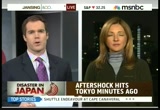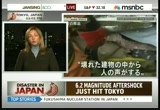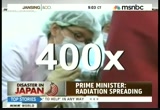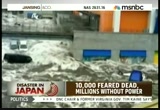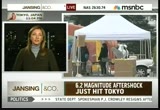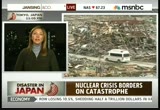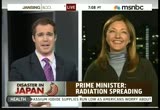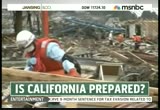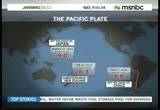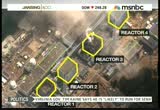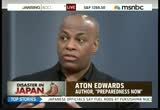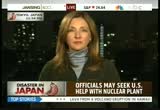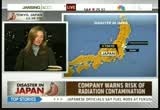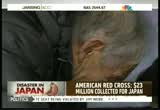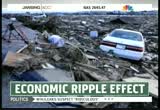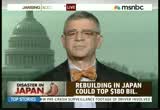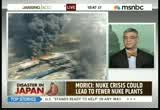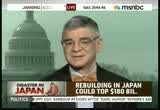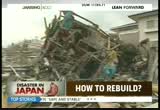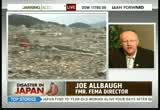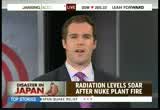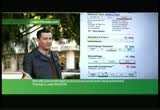tv Jansing and Co. MSNBC March 15, 2011 10:00am-11:00am EDT
10:00 am
we'll tell you exactly why and what is moving your money. on capital, budget battles to imand treasury secretary tim geithner on the economy. i'm peter alexander reporting from world headquarters in new york. we are getting new reports of a series of aftershocks right now in tokyo. folks on the ground say these are the strongest that they have felt in days. the disaster in japan is reaching new levels escalating to what very likely could become a potential nuclear crisis. radiation from nuclear facilities is spreading after another explosion even japan's prime minister admitted there is a high risk of further leaking, but they insit right now that people should not panic and that the risk to citizens is still, to use their language, very low. some of the saddest images coming out of the town of minami-sanriku where the water poured into a hospital that now looks a lot more like a morgue. a nurse explained the water
10:01 am
simply took everyone. 10,000 are feared dead across japan as a result of this the awful disaster. we do want to the focus on some of the hope, as well. five days after the quake and the tsunami, there still are amazing rescues taking place. some of them within the last several hours. today, both a man and woman survivors, and obviously the faces of hope, as well. chris jansing, the host of this program "jansing and company" is in tokyo where she's following the latest developments. i want to ask you about those aftershocks. we heard about them by e-mail. you experienced them firsthand. can you give us a sense of how strong they were and what it was like? >> peter, you lived in california as i did. we both experienced earthquakes before. what is surprising to me before, and i've been here three days, there have been aftershocks every day. they're stronger than anything i ever felt when i was in california.
10:02 am
this one was originally reported as a -- my producer is telling me it's a 6.1. i thought at first it was three aftershocks but i think now it was one that was building, and it was really shaking inside our work space, and one of our other correspondents was up here, and she said you could see the lights shaking. she felt it, too. it is a very visceral kind of reminder of what's been going on in this country since last friday. of course, peter, we have a terrible situation with the nuclear disaster over the last 24 hours, as you as you mentioned, another fire, another explosion. this is now the second worst nuclear disaster in history. not as bad as chernobyl but worse than three mile island, and it's not over yet. >> the explosion at reactor number 2 has broken a hole in the cement container around the core. the fire at number 4 spewing it forsythia amounts of radio
10:03 am
active material. it's a dramatic escalation of the crisis that shows no sign of slowing. japan's prime minister urged calm. even as residents around the crippled plant lined up for radiation tests and experts said there's a very high risk of further leakage. >> i think there is a genuine concern been panicking people, and these are all factors and some of it is subconscious. >> only 507b brave employees are trying to stave off a total meltdown with radiation levels near one reaer 400 times the normal amount a human should experience in a year. at the u.s. embassy this couple brought their 3-year-old and applied for passports for their twins. >> has the nuclear situation made rethink staying in japan? >> depends on how the wind blows. >> literally? >> literally. if the wind blows this way, then the quickest flight we can get.
10:04 am
by then it's toot late. >> aid flights are starting to bring supplies to more than half a million people displaced by the disaster, many in shelters. too many still desperate for word of missing loved ones. >> my daughter was washed away. i don't know what to say. i hope my daughter is still alive somewhere. >> reporter: five days after walls of water decimated town after town, hope is dwindling. 2,000 more bodies washed away in the tsunami have now come ashore. the local hospital turned into a morgue. only the fifth floor escaping the devastation. but then the very picture of a miracle. a man buried under the rubble all this time just rescued. alive against the odds. such a wonderful thing to see. we very every day seen what seemed a miraculous recovery, a little girl reunited with her father just yesterday.
10:05 am
i want to let you know, peter, we just got word in the last half an hour that at two the u.s. naval bases here in tokyo, they have recorded low levels of radiation. we are gotten reports that radiation levels here in the capital centre were elevated. they're advising people on the bases to stay indoors. i think this is the u.s. 7th fleet. yes, it is the u.s. navy 7th fleet issuing a statement about that telling folks who can to stay indoors. there is not a major health concern at all. but this is out of a precaution that they're asking people to do that, peter. >> i was taken by that conversation that you had with the wright family saying it literally is the winds that will dictate their decision. once those winds turn toward tokyo where they are, it would be too late for them to leave. in terms of a broad picture, in terms of americans there, are the airports seeing a flood of people who are initiating the process of trying to leave even as a precaution right now? >> reporter: absolutely. at airports, we have seen it at
10:06 am
train stations. and also, when i was standing outside, that was not the only family that came out in the hour that i was outside the u.s. embassy. there were three families, all of them considering leaving. then i talked to the wife of a u.s. embassy official and she said that the ambassador himself had just held a meeting for embassy staff, and their families. now they are not recommending, as the french government is, that the citizens leave. they're asking that they pay close attention to what the japanese government is saying. i think it is fair to say based on the number of foreigners that i have talked to here, english-speaking foreigners, there is a great deal of concern, caution, and there are a number of people, in spite of the fact that many of them have worked here for years, have jobs here, homes here, raising a family here who are considering whether it's safe to stay. >> we're going to focus a lot about the effects of nuclear radiation, the effects of effects. the challenge is obviously to
10:07 am
try to get to those communities that are the ground zero as it were for japan right now, but a lot of people have made the smart decision, which is to move from there. is there an effort to evacuate a wider range of people, not just in the immediate 10 to 12 mile range but a larger number of people who are forced to leave their communities behind? >> right now, that's the subject of a lot of controversy because as you reported at the top, peter, they have well over 100,000 people. they've told them to stay inside and to essentially lock their doors. here's the problem, and i think that plrnlg wright said it very succin succinctly. i've had this conversation with officials as well, that this is such an unprecedented situation and it's moved in a way that obviously the japanese government had not anticipated, that it may well be a situation where by the time it's vet clear that you need to move or you need to go, by then it's already too late. and i did talk to a nuclear
10:08 am
official earlier today. and he said that he thinks that's the real concern for the government. he thinks they need to move that area of evacuation wider, not because right now the threat is so real, but because you need to be anticipator to rather than reactionary. >> chris, we appreciate it. we are holding down the ft. at "jansing & co." we'll move on right now and give you a thrill headlines right now. the breaking news from wall street. a major selloff on the worries about the escalating nuclear crisis in japan. stocks are down all across the board. this is a major headline today. 256 points you can see on the big board right now at the nyse. the new york stock exchange did take the rarely used step of invoking what they call rule 48, in the simplest of terms a measure used to try to smooth
10:09 am
trading at volatile times at the opening of the market. stocks in japan plunged more than 10%. they capped their worst two-day perform tense since 1987. we're also watching several live events going on right now in and around our nation's capital. energy secretary steven chu is testifying before a house subcommittee about his department's budget. we're going to listen to hear whether he says anything about the growing nuclear crisis in japan, as well, if that happens, we will let you know. on the other side of the hill, general david petraeus is facing the senate armed services committee, his first opportunity since taking over as the afghan war commander he is expected to defend the president's timeline for beginning to withdraw troops this summer as lawmakers grow increasingly skeptical about the war there, republicans want answers about security on the ground and democrats have doubts about the war strategy. we're going to watch how this
10:10 am
plays out today and bring you any significant developments, as well. in arlington, virginia, the last world war i, frank buckles was 110. buckles will be buried at arlington, that happens later this afternoon. president obama has ordered all federal flags flown the an half-staff today. experts say a 7.8 quaking in california would kill as many as 2,000 people. the one that hit japan was a 9.0. so what is the most budget-strapped state in the nation, the world's eighth largest committee doing to prepare for the unthinkable? also, more on what you can do to help those people hardest hit by the disaster. we've been hearing from you, and we'll have the answer to that, as well. you're watching jansing and company".
10:11 am
we all have one. that perfect spot. a special place we go to smooth out the ripples of the day. it might be off a dock or on a boat. upstream or in the middle of nowhere. wherever it may be, casting a line in the clear, fresh waters of michigan lets us leave anything weighing us down back on shore. our perfect spot is calling.
10:12 am
10:14 am
back now live on msnbc. i'm peter alexander. scientists warn it's only a matter of time before a major earthquake hits california. it has been more than 20 years since the low ma preet at that time jake shook san francisco in the middle of the world series. i remember it vividly. there are now a series of recent quake along the ring of fire that suggests is california might want to take a close look at it's level of preparedness. >> just as seems to have happened in the last year around the pacific ring. statistically, there's a beguiling possibility that now is the time when people should start thinking about what might happen if one, the san andreas fault should rupture or the cascadia fault which hasn't for 250 years.
10:15 am
>> 250 years. they fear it is waiting to happen. karen bass represents california's 33rd district, which includes parts of los angeles county. she now joins us live from washington. it's so nice to visit with you. sti appreciate your time. >> thanks for having me on. >> i want to get your sense of the state of california and its preparedness. i go guess in the simplest of terms, is california prepared for a major earthquake? >> well, i do think that california is prepared on an annual basis, we have what's called the great shakeout where close to 8 million people participate in the preparation. now, having said that, we certainly have to study what's happened in japan and see what we can do better. and in particular, i want to look at how we're dealing with elderly people who are disabled and could we get them out in time. >> representative bass, as you know well living in california and as a californian myself, i know too well the challenges that exist not just in terms with people but also in terms of infrastructure.
10:16 am
when we speak about california, and the state has a major budget crisis right now. we'll put up the numbers on the screen as a read them along. the legislative analyst's office predicts a $19 billion deficit in the next fiscal year and $22 billion the year after that. so for a state that can barely pay its employees, where is the money for earthquake preparedness and are you going to go to the president and others at the capital san say we need your help now? >> absolutely. it is a major concern of mine. ironically, as california debates the budget this week and i so hope that they're able to come to resolution, i certainly want to see if there's anything that we can do here on a federal level to be of help to california. but ironically, while we're debating the budget here, some cuts that were proposed by my colleagues on the other side of the aisle called for a 20% reduction in the national weather service. ironically, that would include layoffs that could impact our preparation for a tsunami, which
10:17 am
we know was impacted by what happened. japan in northern california and southern california. so when we're talking about cuts, they have to be done with surgical precision and we have to look for a way to bring resources to california. >> representative bass, put this in real specific terms right now. i'm heading back to the san francisco bay area tomorrow. when i get there, going from the east bay to san francisco, you'll still travel across the old bay bridge. the new bridge isn't completed that's supposed to be better prepared to handle an earthquake. where are the specific places we are most vulnerable in california right now? >> certainly the bridges. we do have to take a look at our nuclear facilities, the plants won't san onofre and diablo canyon. licensing is coming up for both plants pretty soon and gives us an opportunity to the examine to see how safe they are. i think your main point is our infrastructure, our roads. that's what we have to be concerned about. as well as our emergency services.
10:18 am
>> the big luxury in japan, if there was one, was the simple fact that they had invested about a billion dollars by some accounts into early warning technology. because of that, they may have had, albeit just 30 seconds, some warning about this quake and ultimately about the tsunami. so i guess the question is -- >> right. >> -- is there money and the political will to push through an early warning system here in the united states that matches the one that likely saved perhaps tens of thousands of lives? japan? >> i certainly hope we can do that. as i understand it, it would cost about $150 million to have an early warning system. i do have to point out even with that system, as you know, the residents in japan only had a few seconds. and so we certainly need to have that in california. but whether or not we can do it right now, i just don't know. given the budget crisis both in the state and in the nation. >> congresswoman karen bass, we share a passion for the state of california. i hope we'll be okay when it happens. we appreciate your help today. >> we've lived through those
10:19 am
quakes, vice president we? >> we have. >> thank you. >> word from the associated press the japanese authorities may spray water from military helicopters to try to help cool these overheating fuel rods in japan. we're just learning about it. experts are calling the nuclear crisis the worst since chernobyl, the second worst in history. now that a third explosion happened at the fukushima daiichi plant, it has caused a dangerous new emergency. the explosion at reactor 4 is a lot more serious than the explosions that rocked 1 and 3. the first two blasts blew apart those rectangular buildings that house the reactors. this new explosion took place within the outer wall of the reactor itself, basically inside the room within that house. that sparked a fire that caused radioactivity to be released directly into the atmosphere. there is also concern that the water used to cool unit 4's fuel
10:20 am
rods could heat to a boil. that means it could evaporate which ultimately would leave the rods exposed. we with joined by etan edwards, author of the book "preparedness now." i want to get a sense, there are reports of radiation levels in tokyo that are ten times normal levels. so as we speak about this, go ahead. >> what i was going to say is when you say ten times normal levels, what they want to do is not create a panic because the normal levels are very, very low. there's a process called radiation hormesis, exposure for long periods. we don't have to worry about that yet but it's getting bad. >> ten times may not be -- but 100 times and more in the area, 12, 15 miles out from the sites. we speak a lot about radiation exposure, about radiation sickness. what is that? what is the impact of radiation? how long can you handle some of
10:21 am
this? and what are the symptoms? >> when you're exposed to radiation, it's a cumulative thing. the longer exposed to a source, the worse it is. the way we used to measure it was in ms. when you're exposed for a long period of time, it's going to do damage to the tisch to you and cells. it particularly hits the gi tract. you're going to have serious damage to the gi track, a lot of diarrhea, pain, vomiting. >> this core lays to cancers down the road. >> yes, cancers down the road. what you want to do is not expose yourself to the radio active material. that may it be unleashed in the effect we have a complete meltdown. >> you're going to show us some of the devices people there can use and people here can be prepared to have if necessary in case of a disaster in the future. i want to ask you one thing. literally on the streets someone asked me, if this is so bad, why are the people who are nearby washing off with soap and water?
10:22 am
can it be removed? >> it's not so much the radiation, it's the particulate. people have misconceptions what radiation is, what fallout material and particulate is. people have to distinguish the difference between a source that emits radiation and material that is radio active that may get on the clothes and the fibrous us material that the clothing is made out of. so that's the problem. people have to know. >> you brought props to demonstrate. >> essentially here you have a partial face respirator, n 100 class which this is basically a respirator that is a portable hepa filter. it filters almost 99.9% of all of the different particulate. i think above two microns in size. >> i'm confused by words like microns. >> very, very tiny particles, you would be able to put this over your face and protect your respiratory system from the inhalation of material. >> the important part is this because it presses against the
10:23 am
skin so nothing comes in the sides. >> this seals it against your face so nothing gets in in the sides. you need this to protect your respiratory system from the inhalation of radioactive material. this is the potassium iodide and iodate. this is iodide. this is a thyroid blocker. one of the by-products is radioactive iodine. that's one of the things you don't want to get absorbed in your system. it produces a lot of damage. what will radioactive i oh dean protects the thyroid. >> i appreciate your time talking to us. there are teams in tokyo preparing with these things in case there's need, as well. we appreciate it your explanation. aton edwards joining us in the studio. next, in libya, is gadhafi winning the war against the fighters trying to topple his
10:24 am
government? also, this is not what mississippi governor needs right now as he considers a run for the presidency. the racially tinged jokes that forced him to fire a top aide. we want to hear from you, as well. what is on your mind. het to twitter at "jansing & co." we'll be right back. time for the your business entrepreneur of the week. brendan wool rich and john were beach volleyball players who turned their passion into a year-round activity. they created the sand box in mystic, connecticut, the only indoor volleyball facility in new england. they're attracting players from around the region to this unique concept. for more, watch "your business" sunday mornings at 7:30 on msnbc. [ female announcer ] water was meant to be perfect.
10:25 am
10:26 am
reduce lead and other impurities castrol syntec has been reformulated for better performance under the hood. so we gave it a new name. castrol edge with syntec power technology. new name. better formula. it's more than just oil. it's liquid engineering. that's how it is with alzheimer's disease. she needs help from me. and her medication. the exelon patch -- it releases medication continuously for twenty-four hours. she uses one exelon patch daily for the treatment of mild to moderate alzheimer's symptoms. [ female announcer ] it cannot change the course of the disease. hospitalization and rarely death have been reported in patients who wore more than one patch at a time. the most common side effects of exelon patch are nausea, vomiting, and diarrhea. the likelihood and severity of these side effects may increase as the dose increases. patients may experience loss of appetite or weight. patients who weigh less than 110 pounds may experience more side effects. people at risk for stomach ulcers who take certain other medicines should talk to their doctor
10:27 am
because serious stomach problems such as bleeding may worsen. people with certain heart conditions may experience slow heart rate. [ woman ] whenever i needed her, she was there for me. now i'm here for her. [ female announcer ] ask the doctor about your loved one trying the exelon patch. visit exelonpatch.com to learn more. back to you live on msnbc. moammar gadhafi is telling rebels trying to overthrow him that they have just a single choice, surrender or flee. government forces have captured the last rebel held town zawiyah west of tripoli. the victory solidifies his hold in the western part of that country. rebel troops are digging in in the east though preparing for an assault by libyan troops. they have deployed several anti-aircraft guns in case of an air attack. also in bahrain, the king has just imposed a three-month state
10:28 am
of emergency. the martial law style type order gives the military broad authority to battle the pro democracy uprising. violent clashes are escalating between police and anti-government protesters. a thousand saudi troops have been dispatched to bahrain to support the royal family there. one soldier was shot and killed by a protester today. meanwhile, secretary of state hillary clinton is arriving in egypt as we speak to urge its military rulers to lay the groundwork for a transition to democracy. this is her first visit since the ouster of president hosni mubarak. the driver involved in that horrific tour bus crash in new york city served prison time on two separate occasions for manslaughter and grand larceny. investigators are piecing together exactly what ophadell williams was doing, what he was eating and how much he slept in the 72 hours leading up to saturday's terrible accident.
10:29 am
>> we want to know what he ate, what he drank, how much he slept, everything we can find out about the activities of the driver in the 72 hours prior. >> the crash killed 15 people, another 20 were injured. and another deadly tour bus crash happened overnight about 50 miles south of where that previous crash took place. two people killed in this accident, including the driver. the bus was driving down the new jersey turnpike from new york's chinatown. about 40 people were taken to hospitals. two are reported to be in critical condition this morning. the nuclear crisis in japan is escalating with radiation levels near one reactor at roughly 400 times the amount that is viewed as safe for people. we're going to check in with my colleague chris jansing live for us in tokyo today. also, the japanese people are pulling together. they are clinging to hope even in the face of unspeakable suffering. ann curry discovered some
10:30 am
amazing people inside the quake zone. we'll share their stories next. what's left behind? [ female announcer ] introducing purifying facial cleanser from neutrogena® naturals. developed with dermatologists... it's clinically proven to remove 99% of dirt and toxins and purify pores. and with natural willowbark it contains no dyes, parabens or harsh sulfates. dirt and toxins do a vanishing act and my skin feels pure and healthy. [ female announcer ] new purifying facial cleanser from the new line of neutrogena naturals. [ female announcer ] new purifying facial cleanser the best approach to food is to keep it whole for better nutrition. that's what they do with great grains cereal. they steam and bake the actual whole grain while the other guy's flake is more processed. mmm. great grains. the whole whole grain cereal.
10:33 am
biblical proportions the loss of life, the change in the economy and the society there. we wish them strength. we want to help them as friends. and again, our sympathy and our support go out to the people of japan. >> that is house minority leader nancy pelosi who happens to be from the san francisco bay area. well familiar with the damage and destruction of earthquakes. speaking about the disaster in japan moments ago. also on capitol hill, energy secretary steven chu testified before a house committee about his department's budget but he also spoke about efforts to help japan. he says the energy department is sending a team of experts to that country to try to provide advice, as well as the much needed technical assistance. in addition, chu says they are
10:34 am
sending technology to help detect and assess any level of contamination found on the ground there. there is he is speaking as we speak. the tsunami and earthquake in japan could be the most costly disaster in world history. estimates put the cost at at least $100 billion. $100 billion. homes, businesses, entire communities as we have witnessed is washed away or reduced to nothing. in light of all the nuclear problems in japan, germany today said it will halt all of its nuclear reactors. chancellor angela merkel said she will order the seven oldest reactors to be kept offline. and president obama says he's heartbroken by the disaster in japan and pledged american support to the help. >> this is as international tragedy. and although japan is a highly advanced economy and technologically equipped to
10:35 am
rebuild at this moment of crisis, it's important that all of us join together in providing any help and assistance that we can in the days and months to come. >> this morning, hillary clinton met with the japanese foreign minister to offer condolences and to help. she promised the international community will do their best to help japan in its time of need. chris jansing, the host of this program "jansing & co." is joining us now from tokyo. and chris, as you've obviously seen things get worse on the nuclear end of this disaster within the last hour or so, you experienced new aftershocks. what we're really looking for is the sense on the ground right now of what people think happens next. how do they prepare for such uncertain times? >> well, you know, it's an individual decision that everybody here is having to make, but it does seem that every hour, there is a new development. just in the last few minutes, for example, we heard from the power company here, an
10:36 am
extraordinary statement that they're considering asking the u.s. as well as japanese military to help them. we've been talking about the fact, peter, there has been an explosion and a fire again at two of the reactors, one of them affecting the spent fuel there. they want helicopters, military helicopters to do a water drop. that tells you how desperate they are, how concerned they are about the release of radiation, in fact, we've obtained a statement from the international atomic energy agency, peter, that says the levels at the plant, and i want to make that very clear, at the plant itself, are enough to kill a man within five hours. this is a dramatic escalation of the problem here, peter. >> a dramatic escalation on top of new numbers. thank you very much. those new numbers refer to the death toll in japan that is expected to "top 10,"000, and people across that country obviously right now doing everything they can to try to
10:37 am
find their loved ones. ann curry has spoken with many of the people who despite losing everything are doing their best to go on. >> reporter: home from the evacuation center for the first time today. tatu, 79 and his sume, 73, were shocked so much was ruined, first by the earthquake and then by five feet of water but they didn't wait for outside help. she says everyone is the same. he adds, i want to get this work over so i can help others. five days into this disaster, a spirit of self-reliance is evident everywhere. helping augment the short water supply, neighbors boil snow they truck down from nearby mountains. they make chopsticks by hand using bamboo they gather themselves. making even cups and bowls.
10:38 am
for people who have lost everything, at this evacuation center, what do you not have enough of here to take care of these people? a local official said people need food is, heat and doctors. so balls of rice are brought in by local women. and the elderly who run out of medicines, are closely watched over and kept warm. rarely has a nation so powerful been this vulnerable. having lost so much, japan appears as broken as its landscape. but it is not. tat tu and sumi say we are old, but we expect the next generation will build us back even better. >> so the smiling faces that give hope right now. obviously just the first few days after the terrible tsunami, th nuclear reactor issue, this is something experts acknowledge will take years for japan to recover from.
10:39 am
if you look at these pictures sent to us from american david specter living in japan, you can get a sense of what people who survived are now dealing with, which is empty shelves. nothing there. compare ta to the people and they're already experiencing such terrible tragedy throughout that region. we'll find out how american aid groups are doing their best to help. also on your screen, you can see what we are watching, the u.s. stock market reacting to the disaster in japan. it is the third largest economy, japan is, home to some of the world's biggest automakers. what be the economic ripple effect? all you pantene 2-in-1 lovers,
10:40 am
this is your lucky day. pantene's 2-in-1's are customized, with 5 new versions. find yours and love it or twice your money back. that's the smart beauty guarantee. 2-in-1's from pantene. healthy makes it happen. 2-in-1's from pantene. but you can still refinance to a fixed rate as low as 4.75% at lendingtree.com, where customers save an average of $293 a month. call lending tree at...
10:41 am
today. her morning begins with arthritis pain. that's a coffee and two pills. the afternoon tour begins with more pain and more pills. the evening guests arrive. back to sore knees. back to more pills. the day is done but hang on... her doctor recommended aleve. just 2 pills can keep arthritis pain away all day with fewer pills than tylenol. this is lara who chose 2 aleve and fewer pills for a day free of pain. and get the all day pain relief of aleve in liquid gels. and fewer pills for a day free of pain. delicious gourmet of gravy. and she agrees. with fancy fest gravy lovers, your cat can enjoy the delicious, satisfying taste of gourmet gravy every day. fancy feast, the best ingredient is love. castrol syntec has been reformulated for better performance under the hood. so we gave it a new name. castrol edge with syntec power technology. new name. better formula.
10:42 am
10:43 am
depression after a still birth or miscarriage may continue in women even after they give birth to a healthy child. a study of over 13,000 pregnant women found those who lost a baby in the past had more anxiety and depression during pregnancy with some still suffering up to three years later. we want to give you breaking news, information we're learning coming from north of tokyo in japan right now. the sort of ground zero of this disaster. the iaea is now reporting that they have imposed a 30 kilometer, which is roughly 19 mile no-fly zone around the disaster site at the fukushima daiichi power plant right now. and also reporting that all of the reactor sites there are said to be using, their language,
10:44 am
safe and stable at this time. obviously the grave concern has been the potential for a nuclear meltdown. and the exposure to spewing radioactivity leaving that site. that information just coming to us right now from the iaea. also making news right now, stocks are getting hammered this morning after japan posted its worst two-day losing streak 24 years. right now, all three major indices are seeing big losses, a little more than an hour into their trading day. as you can see on the screen right now, the dow down roughly 200 points, the nasdaq down about 50 points. mandy drury is joining me now. can you explain, mandy, obviously the u.s. and japan are strong trade partners. >> you know, first of all the worry was so great at the stock exchange this morning we would see the steep selling they invoked rule 48. that helps to smooth out the stock market's open. it was only invoked twice in
10:45 am
2009 as we saw a moment ago, stocks are down here in the u.s. but are off their lows. global investors are extremely nervous still. the japanese market had plunged over 10% last night down almost 19% in the past four trading sessions alone. the fear of a nuclear crisis is spreading. some have called this market decline irrational or a panic move. other commentators are saying the unstable situation at those plants and the potential hit to the japanese market would have a ripple effect over the global economy and the companies that do business there does justify their caution. due to the damage at plants and infrastructure and power out ands, major automakers and suppliers have extended their halt in production at least till tomorrow. there's a growing list of industries is. they're also suspending parts of operations due to a government mandated power cut. back to you, peter. >> mandy, thank you very much. while we're on the topic of
10:46 am
japan and the economy, we are joined by the university of maryland economist peter maurici. there are fears right now that the death toll in that will country could "top 10,"000 people. the damage to the economy, obviously, is secondary but certainly something that is shaking world economies right now. world markets with some estimating it could reach $180 billion. is that a number that you can give us perspective? does that even sound like a possibility? >> that sounds like a possibility. that's about 2% or so of japanese gdp, about 1.25% of u.s. gdp. that's what we would expect from something like this. it's something that can be overcome. japan will recover. a good deal of its industrial base is unscathed. it's a matter of containing the nuclear problem and getting on with rebuilding the homes and people's lives. >> people are surprised to hear japan has the third largest economy in the world. if you give it perspective is,
10:47 am
it's roughly 128 million people fitting in a country roughly the size of montana. that's the population in such a dense area. in terms of the impact on then country of what they're experiencing, where will we see it most, aside from people watching the market's volatility today, where will it affect americans most quickly? >> they'll see it in the availability of products that the japanese make and make so well. the camrys won't be available, the japanese are very important in the production of computers through computer chips can of various kinds. there are alternative sources of supply for all of those items. they have strong competitors now that they didn't have 20 years ago. for a period of 60 to 90 to 120 days, prices will be higher. then those other suppliers will come on stream more effectively and prices will subside because there's a lot of excess capacity in the world right now. >> give us a sense, aside from automakers which we're so familiar with the automakers, what else is japan exporting to
10:48 am
us that americans can anticipate seeing a price spike on? >> things like computers because of the chips they make that go into those computers, cameras, all kinds of electronic devices that have a smart chip. they compete with caterpillar. you won't see this in the store. but folks in construction will see it. komats su will become less available and caterpillars will become more valuable. >> pete ter morici helping to explain this to us today. from the ample american to the biggest celebrity, people are doing everything they can to try to help those in such dire need right now in japan. among those, celebrities like lady gaga designed a japan prayer bracelet with all the proceeds going to relief efforts. when you consider all the people who follow her, this could raise quite a bit of money. today's tweet of the day comes from lady gaga who writes monsters in just 48 hours have
10:49 am
you raised a quarter of a million for japan relief. it's important we help. gaga includes a link to her we be site where you can buy the bracelet. we'll have more on the relief efforts inside japan coming up next. f f with country vegetable soup over it, you can do dinner. 4 minutes, around 4 bucks. campbell's chunky. it's amazing what soup can do.™ to finish what you started today. for the aches and sleeplessness in between, there's motrin pm. no other medicine, not even advil pm, is more effective for pain and sleeplessness. motrin pm. thank you very much. you're on e-trade. huntin' down stocks, bonds, etfs. oh i love etfs. look at you. why don't you show me your portfolio? i'd love to... i already logged out. oh no, it's easy, actually, to get back... see where it says history? there's a history? yeah, it'll take you right back to the site you were just on. well the last site... [ british vo ] and now, cycle complete. the male wildebeest returns to propagate the herd. [ animal grunts ]
10:52 am
so far $23 million in donations have been offered to help japan rebuild. where do you begin in a situation like this? entire towns and villages as we have seen reduced to rubble, roads washed away. this video is from what's left of the northeast coastal city of onato from itn that went to inspect the damage there. some economists say the cost to rebuild could top $180 billion. joining us now is the former bush fema director joe abla with the alba international group. on the phone is michelle jackson, the emergency response
10:53 am
manager for americorps. joe, we'll begin with you. what is job one right now as they begin to tackle the rebuilding of japan even while dealing with another tragedy taking place as we speak, the nuclear recan the anner site and the devastation as a result of that? >> good morning, peter. the first thing to do is to make an assessment of all your assets that you have you available to you. this is naes so you install a command structure, begin to divvy up the task as they come into the command office. >> it's really logistics that's your challenge, isn't it, sir? >> absolutely it's logistics and personnel. you have your nuclear experts worrying about all four facilities right now. and you have to get the bodies in place to start the recovery process. one of the things testify concerned about is fresh water. you've seen that they've relocated folks outside of a
10:54 am
12-mile radius. i would prefer that that was a larger radius, probably double that size but fresh water is going to be important. i would even start laying a temporary water line along highways to get water from the south up to the north. water is going to be a necessary part for everyone's survival. >> obviously, we've witnessed the long lines and the empty store shelves as people try to get gas, water and food. michelle, your group americares is providing relief supplies to the people in japan. what are the primary needs for like the immediate short-term, and what are the long-term needs? what specifically do you need? >> sure, thanks. yes, we have about 30 years of experience. we're just coming off haiti and chile. this is a very different and highly organized setting. we're working directly with the hospitals and the aim is to partner with local agencies to deliver things and avoid duplication in our efforts.
10:55 am
what we're seeing at the hospital level is a huge need for basic medicines like over the counter meds like aspirin, also just very basic consumables like gauze and disinfectants. a need for dialysis in the long-term for patients who won't be able to receive this treatment at the hospital setting. in the long-term entirely in a setting like fukushima where there's going to be a large population affected and their health needs significant over the coming weeks and months, we are prepared to deliver things associated with radiation poisoning. medicines for headaches, vomiting, seizures. >> michelle jackson and joe allbaugh, obviously the rebuilding of japan is going to be a long process. we appreciate both you guys weighing into the conversation right now. thanks so much. >> thank you. for more how you can help and people have been asking us,
10:56 am
the best way is to go to our website, msnbc.com. that's going to wrap up things for this hour of jansing and company. i'm peter alexander. chris jansing is in japan reporting. thomas roberts picking up things from here. >> good morning, everybody. we're going to be talking more about the dramatic escalation concerning japan's fukushima daiichi nuclear plant along its northeastern coastline. dangerous levels of radiation are leaking. only 50 employees are trying to get the plant under control. back here at home, the u.s. budget battle continues in d.c. where lawmakers can only agree on short-term government funding. where is the focus and the agreement for the long-term? we get you in the loop straight ahead. stay with me. that's why there's brita, to make the water we drink, taste a little more, perfect. reduce lead and other impurities with the advanced filtration system of brita.
10:57 am
with snakes and boogeymen. and no cartoons. but she got out, right, mommy? no. she was stuck in there for 100 years all by herself. that's why we never take mommy and daddy's strawberry cheesecake temptations. okay! bedtime. [ male announcer ] six indulgent layered desserts at 150 calories or less. new temptations. it's the first jell-o that's just for adults. how can expedia now save me even more on my hotel? well, hotels know they can't fill every room every day. like this one. and this one. and oops, my bad.
10:58 am
so, they give expedia ginormous discounts with these: unpublished rates. which means i get an even more rockin' hotel, for less. my brain didn't even break a sweat. where you book matters. expedia. today, investors want retirement planning on their terms. i want to work with people who are objective. how about a plan with my name on it... not someone else's. can we start with realistic goals please? and research that's strictly third party. show me how to keep more retirement money in my pocket. now, and down the road. those are my terms. those are my terms. those are my terms. then this is your place. td ameritrade. where millions of investors plan for retirement on their terms.
10:59 am
161 Views
IN COLLECTIONS
MSNBC Television Archive
Television Archive  Television Archive News Search Service
Television Archive News Search Service 
Uploaded by TV Archive on

 Live Music Archive
Live Music Archive Librivox Free Audio
Librivox Free Audio Metropolitan Museum
Metropolitan Museum Cleveland Museum of Art
Cleveland Museum of Art Internet Arcade
Internet Arcade Console Living Room
Console Living Room Books to Borrow
Books to Borrow Open Library
Open Library TV News
TV News Understanding 9/11
Understanding 9/11
